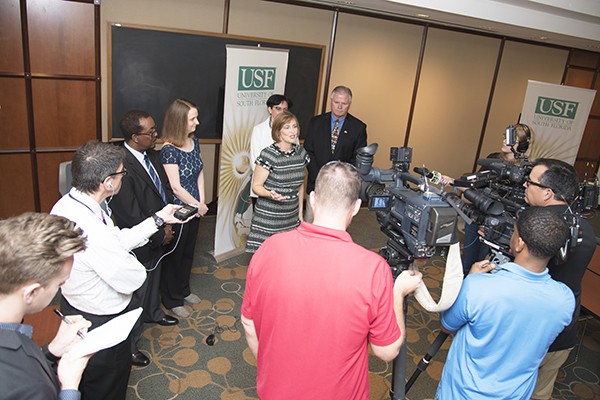Funding from National Institutes of Health (NIH) helps USF conduct groundbreaking research every year.
As a leading research university, the institution attracted more than $130 million from NIH in fiscal year 2016 to conduct research in various areas including neuroscience, Alzheimer’s, heart disease, diabetes, cancer and more.
“NIH funding helps USF find treatments and cures for many diseases,” said U.S. Rep. Kathy Castor, who represents the 14th District of Florida. “But, a new budget proposal from the White House would decrease about 20 percent of NIH funding. This could affect many research institutions around the country, including USF.”
To discuss the matter, Castor emphasized the importance of NIH-funded research for USF, the region and population health during a press conference on April 10 at the USF Health Byrd Alzheimer’s Institute.
“It’s really important to our community that health innovation remains one of our strengths,” Castor said. “That’s why I’m really concerned that the funding cuts will prevent researchers from conducting important research that help make our communities healthier.”

U.S. Rep. Kathy Castor emphasized the importance of NIH-funded research during a press conference on April 10 at the USF Health Byrd Alzheimer’s Institute.
During her visit, Castor met with several researchers who specialize in Alzheimer’s disease, cardiovascular diseases and maternal-fetal medicine. They were Samuel Wickline, MD, founding director of the USF Health Heart Institute and professor in the Department of Cardiovascular Sciences; Laura Blair, PhD, research assistant professor in the Department of Molecular Medicine at USF Health; Anthony Odibo, MD, professor in the Department of Obstetrics and Gynecology at USF Health Morsani College of Medicine; and Hana Totary-Jain, PhD, assistant professor in the Department of Molecular Pharmacology and Physiology at USF Health Morsani College of Medicine.

USF Health Morsani College of Medicine faculty members meeting with U.S. Rep. Kathy Castor to discuss their research were, from left, Anthony Odibo, MD, professor of obstetrics and gynecology; Laura Blair, PhD, research assistant professor of molecular medicine; Hana Totary-Jain, PhD, assistant professor of molecular pharmacology and physiology; and Samuel Wickline, MD, founding director of the USF Health Heart Institute and professor of cardiovascular sciences.
“In order to maintain scientific progress, we have to keep young people interested in doing science,” Dr. Wickline said. “If the NIH budget is cut, all the young people interested into science will go find something else to do.”

Samuel Wickline, MD, founding director of the USF Health Heart Institute and professor in the Department of Cardiovascular Sciences.
Castor stressed the importance of keeping young scientists interested in medical research. “If we don’t provide consistent funding, they will go to other countries, find other jobs or their careers will come to an end,” she said.
Dr. Wickline also said that USF is constantly growing — building a new medical school combined under one roof with the Heart Institute downtown, recruiting new faculty and attracting top-quality scientists from the U.S. and around the world.
“If the budget is cut or not improved, I foresee a very challenging environment that could put a damper on the programs we hope to have in place in the next few years,” he said.

Castor speaks with Aisha Remy (far right), a USF biomedical sciences student, during a tour of Dr. Blair’s laboratory at the USF Health Byrd Alzheimer’s Institute.

The Congresswoman met students working in a USF Health Byrd Alzheimer’s Institute research laboratory.
Story and photos by Vjollca Hysenlika

